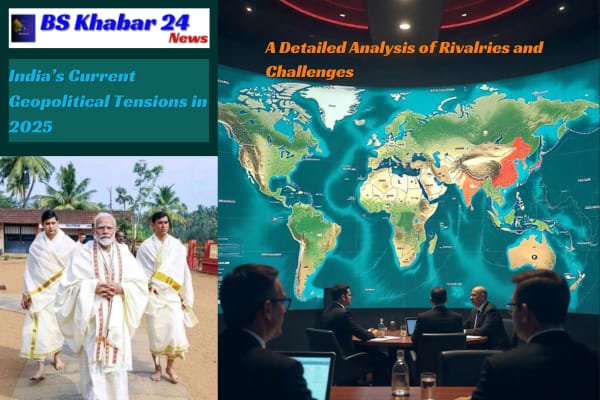India’s Current Geopolitical Tensions in 2025: A Detailed Analysis of Rivalries and Challenges
As a growing world power, India has always kept a convoluted network of diplomatic ties with other nations. Although its relationships with allies are still growing, tensions with a number of countries have been caused by geopolitical disputes and divergent policies. For a variety of political, economic, or geopolitical reasons, the following nations are viewed as India’s enemies or adversaries in 2025.
1.Bangladesh
The relationship between Bangladesh and India has been worse recently, despite their shared history and culture. The tense relations have been exacerbated by border tensions, disputes over water sharing over the Teesta River, and Bangladesh’s increasing closeness to China. Additionally, charges of illegal migration and security threats along the India-Bangladesh border have further complicated the relationship.
2. Pakistan
The Kashmir dispute is the main cause of India and Pakistan’s long-standing animosity. Tensions are nevertheless heightened by cross-border terrorism, frequent ceasefire violations, and Pakistan’s purported assistance for separatist organisations. Anger between the two countries has increased as a result of Pakistan’s international campaigning against India and the repeal of Article 370 in Jammu and Kashmir.
3. China
In addition to China’s support for Pakistan, its expansionist policies in the Indo-Pacific, and trade imbalances, the India-China border dispute, especially in the Ladakh region, continues to be a major flashpoint, with the 2020 clash in the Galwan Valley marking a turning point and subsequent military standoffs between the two Asian giants.
4. Malaysia
Malaysia’s criticism of India’s domestic policies, such as the repeal of Article 370 and the Citizenship Amendment Act (CAA), has deteriorated relations between India and Malaysia. Another source of concern has been Malaysia’s strong defence and commercial connections to Pakistan. The dispute’s economic aspect is further demonstrated by India’s limitations on importing palm oil from Malaysia.
5. America (USA)
Despite their long-standing strategic cooperation, India and the United States have recently seen some divergences. Friction has resulted from trade limitations, human rights concerns, and the U.S. position on India’s defence relations with Russia. New Delhi is also concerned by America’s slant on China and Pakistan in some geopolitical issues.
6. Canada
Canada-India relations soured due to Canadian Prime Minister Justin Trudeau’s stance on the Khalistan movement. India has repeatedly accused Canada of harboring separatist elements and interfering in its internal matters. Diplomatic tensions escalated after Canada made allegations against Indian agencies regarding certain operations abroad, leading to a breakdown in trust.
7. Turkey
Turkey has publicly backed Pakistan in the Kashmir dispute and has denounced India’s policies in international fora like the UN. Bilateral relations have deteriorated as a result of Turkish President Recep Tayyip Erdoğan’s harsh anti-Indian rhetoric and Turkey’s expanding military cooperation with Pakistan.
8. Ukraine
India and Kyiv are facing diplomatic difficulties as a result of India’s neutral position on the conflict between Russia and Ukraine. India’s ongoing trading with Russia, especially in the energy and defence sectors, has drawn criticism from Ukraine. India-Ukraine relations have become even more strained as a result of the Ukrainian government’s outreach to Pakistan for military cooperation and arms deals.
9. Azerbaijan
Azerbaijan’s tense relationship with India is partly a result of its strong links to Pakistan and Turkey. Azerbaijan has been critical of India’s foreign policy and has publicly backed Pakistan on the Kashmir conflict. Tensions between the two countries have also increased as a result of India’s backing for Azerbaijan’s adversary, Armenia.
10. Britain
Britain used to be India’s colonial ruler, but for a variety of political and economic reasons, its relationship with India has deteriorated in recent years. Friction has been brought on by the UK government’s position on human rights concerns in India, its interactions with anti-Indian elements including Khalistani groups, and commercial disagreements. Furthermore, diplomatic ties have been difficult because of the UK’s alleged bias in addressing India-related issues in international fora.
Conclusion
Diplomacy is still active even if India confronts difficulties with these countries. Over time, these linkages may change as a result of political, economic, and global circumstances. India keeps up its dialogue and negotiations to safeguard its strategic interests and uphold its international reputation in spite of the tensions. Whether these tensions worsen or if diplomatic attempts result in reconciliation will be determined in the upcoming years.







FJPFyz rgdIwe xzfQ yQJDO xaU xffZmLPx
При заказе услуг важно учитывать xrumer цена https://www.olx.ua/d/uk/obyavlenie/progon-hrumerom-dr-50-po-ahrefs-uvelichu-reyting-domena-IDXnHrG.html, которая зависит от сложности работы.